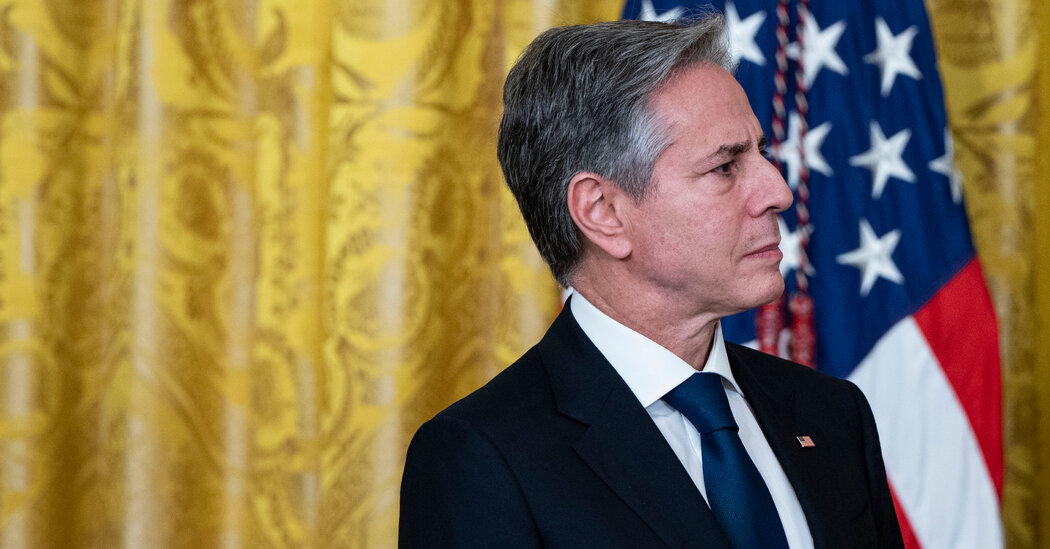
In a meeting in Beijing on Friday, China’s leader, Xi Jinping, traded warm smiles with Bill Gates and praised Mr. Gates as “the first American friend” he had met this year.
The encounters in Beijing between Secretary of State Antony J. Blinken and his Chinese counterparts, starting on Sunday, are likely to feel noticeably chillier.
The high-level meetings are aimed at getting the U.S.-China relationship back on track, and many American business leaders have been pushing the Biden administration to try to restore some stability in one of the world’s most important bilateral relationships.
But for business leaders, and for officials on both sides, expectations for the meetings appear modest, with two main goals for the talks. One is to restore communication between the governments, which broke down this year after a Chinese surveillance balloon flew into U.S. airspace and Mr. Blinken canceled a visit scheduled for February. The other is to halt any further decline in the countries’ relationship.
There is already evidence of the impact of the fraying ties. Foreign direct investment in China has fallen to an 18-year low. A 2023 survey by the American Chamber of Commerce in China showed that companies still see the Chinese market as a priority, but that their willingness to invest there is declining.
“The economic relationship has become so dismal that any sign of progress is welcome, though expectations are low for any sort of a breakthrough,” said Jake Colvin, the president of the National Foreign Trade Council, which represents multinational businesses.
“The hope is that high-level dialogues like this can start to inject some certainty for business into an increasingly fraught and unpredictable trade relationship,” he said.
Still, as one of the world’s largest consumer markets and home to many factories that supply global businesses, China exerts a powerful pull. This year, as it eased its travel restrictions after three years of pandemic lockdowns, a parade of chief executives made trips to China, including Mary Barra of General Motors, Jamie Dimon of JPMorgan Chase and Stephen Schwarzman of Blackstone.
On a visit to China this month, Elon Musk, the chief executive of Tesla and owner of Twitter, described the American and Chinese economies as “conjoined twins” and said he opposed efforts to split them. Apple’s chief executive, Tim Cook, traveled to China in March and lauded the company’s “symbiotic” relationship with the nation.
Sam Altman, the leader of OpenAI, which makes the ChatGPT chatbot, appeared virtually at a conference in Beijing this month, saying American and Chinese researchers should continue to work together to counter the risks of artificial intelligence.
The tech industry, which has forged lucrative relationships with Chinese manufacturers and consumers, has warily watched Washington’s aggressive approach to China. While industry groups acknowledge the importance of moves to safeguard national security, they have urged the Biden administration to carefully calibrate its actions.
Wendy Cutler, a former diplomat and trade negotiator who is now vice president at the Asia Society Policy Institute, said the United States and China might announce some small steps forward at the end of the meetings. The governments might agree, she said, to increase the paltry number of flights between their countries or the visas they are issuing to foreign visitors.
But both sides will have plenty of grievances to air, Ms. Cutler said. Chinese officials are likely to complain about U.S. tariffs on goods made in China and restrictions on U.S. firms selling coveted chip technology to China. American officials may highlight China’s deteriorating business environment and its recent move to bar companies that handle critical information from buying microchips made by the U.S. company Micron.
“I’m not expecting any breakthroughs, particularly on the economic front,” Ms. Cutler said, adding, “Neither side will want to be smiling.”
American officials hope Mr. Blinken’s visit paves the way for more cooperation, including on issues like climate change and restructuring the debt loads of developing countries. Other officials, including Treasury Secretary Janet L. Yellen, are considering visits to China this year, and Mr. Xi and President Biden may meet directly at either the Group of 20 meetings in Delhi in September or an Asia-Pacific economic meeting in San Francisco in November.
In recent months, Biden officials have tried to mend the rift between the countries by arguing for a more “constructive” relationship. They have echoed European officials in saying their desire is for “de-risking and diversifying” their economic relationships with China, not “decoupling.”
But trust between the governments has eroded, and Chinese officials appear to be skeptical of how much the Biden administration can do to restore ties.
The extensive U.S. restrictions on the semiconductor technology that can be shared with China, which were issued in October, continue to rankle officials in Beijing. The United States has added dozens of Chinese companies to sanctions lists for aiding the Chinese military and surveillance state, or circumventing U.S. restrictions against trading with Iran and Russia.
Biden administration officials are weighing further restrictions on China, including a long-delayed order covering certain U.S. venture capital investments. And the White House faces intense pressure from Congress to do more to crack down on national security threats emanating from Beijing.
Not all companies are pushing for improved ties. Some with less exposure to China have tried to reap political benefits in Washington from the growing competition with the country. Meta, the parent company of Facebook and Instagram, has repeatedly raised concerns about TikTok, the Chinese-owned video app that has proved a formidable competitor to Instagram.
“It’s really a dispute over the degree,” said James Lewis, a senior vice president at the Center for Strategic and International Studies. “How accommodating are you? How confrontational are you?”
How aggressively companies are resisting the tensions with China, Mr. Lewis said, is linked to their exposure to the country’s market.
“I think a lot of this has to do with your presence in China,” he said.













